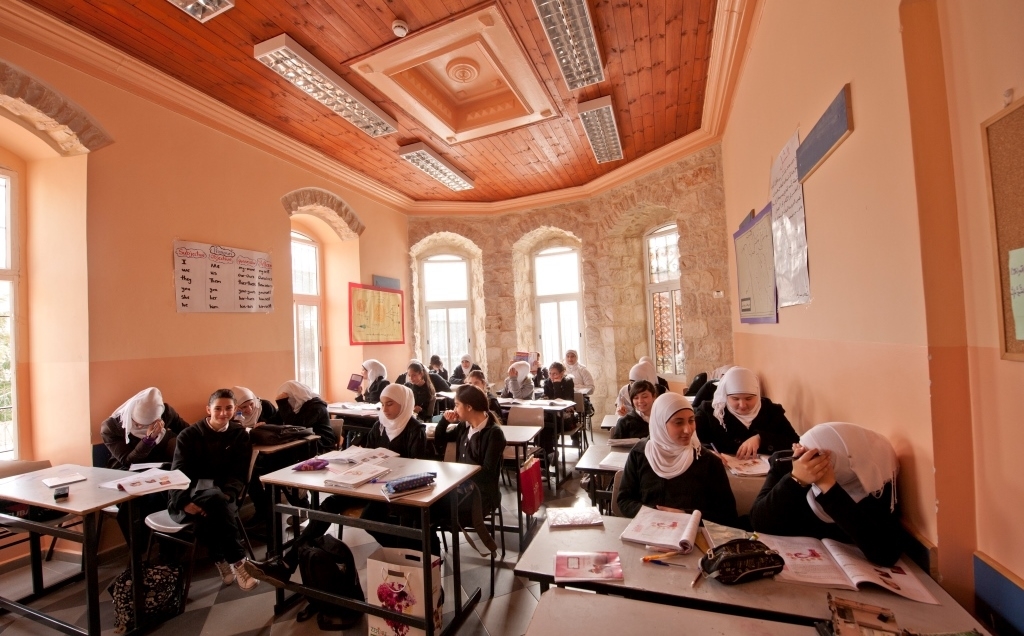
A historic building from the Mamluk era’s multiple functions across history; junction turned prison, turned hub for the Afrtican Community, and most recently turned into a Cultural Minaret Al-Ribat Al-Mansoury is located in the Western side of Al-Haram Al-Qudsi, it overlooks Bab Al-Nather street, which links Al-Qadi road with Al-Aqsa mosque. Al-Ribat’s construction dates back to the Mamluk era (681 AH/ 1282-1283 AD) when it was built during Sultan Qalawoon Al-Salhi’s rule to provide shelter for the underprivileged and for Jerusalem’s visitors.
Al-Ribat started being referred to as Habs Al-Ribat (the prison of Ribat) near the end of the Ottoman rule and at the beginning of the 20th century when it was transformed into a prison. The African population started residing in Al-Ribat given its proximity to Al-Aqsa mosque where they served as guards and care takers, as well as served its visitors. Overtime, Al-Ribat started being affiliated with the African community which later established a Community Association there.
Members of the African Community Association presented OCJRP with a request to rehabilitate its premises which are based in Al-Ribat’s Western area and are being used as a community center. In response, OCJRP invested 237,278 USD in rehabilitating the place by retiling all of its flooring using stone tiles, re-organizing the tiles to create historic patterns derived from Muslim architectural heritage, introducing a mezzanine floor, and re-organizing the main hall’s space in order to introduce a sewing workshop and a musical workshop; both of which are surrounded by sound insulated walls. Investments also went towards rehabilitating the center’s infrastructure, installing surveillance cameras, a cooling and mechanical ventilation system, a computer network, fire alarms, as well as the needed electricity and water supply extensions.
OCJRP’s comprehensive rehabilitation came at a much needed time, as per the Executive Manager of the African Community’s Association. While the Association had attempted a youth-led rehabilitation in the past, the first rehabilitation was not able to meet the center’s comprehensive needs, and was counteracted by Israeli excavations in the areas as well as environmental factors such as high humidity rates. The African Community Association’s request also stemmed from its programmatic expansion into offering child and youth development interventions, both of which required that the center’s capacity and infrastructure be upgraded.
While OCJRP’s rehabilitation was faced with numerous challenges including a 1 month halt by Israeli authorities under the alibi of wanting to “investigate the rehabilitation mechanism,” it has successfully enabled the African Community Association to proceed with expanding its programmatic interventions. The Association’s newly introduced sewing workshop has enhanced the economic livelihoods of 10 female residents of the old city of Jerusalem, as well as the livelihoods of their families. Young residents of the old city have also benefited from the rehabilitation.
Mohamed Abdel-Fatah, a young resident of the area, has been using the rehabilitated space to convene members of Al Quds cinema club and to hold for film screenings for youth.
The rehabilitation has also expanded the use of the space beyond members of the African Community, fostering linkages and interaction between the old city’s residents. Today, the rehabilitated space has become a hub for meeting and implementing social and cultural activities. An example of such activities is a monthly meeting organized by Zedny Club during which 100 young people convene, as well as Live your Dream youth group’s music and dance trainings which engage a minimum of 60 students per training.
In following up with residents within Al-Ribat’s vicinity, it became evident that the rehabilitation caused a dramatic increase in cultural and social activities taking place at the community center. Residents also expressed that the increase in activities has enhanced the community’s cohesiveness and overall civic awareness and engagement.
